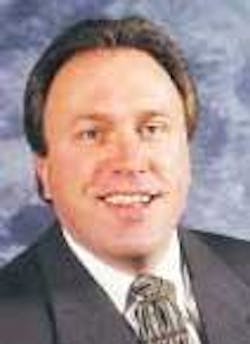Commemorating 30th year, BICSI also welcomes new president
Telecommunications association BICSI (www.bicsi.org) commemorates its 30th year of service this year with activities that kicked off last month at the organization's annual conference. The conference was held January 13-15 in Orlando, FL. Also at the conference, BICSI officially installed its new president, Russ Oliver, who will serve a two-year term. He succeeds outgoing president John Payseur in the leadership role.
Cabling Installation & Maintenance magazine interviewed Oliver as he was about to take office. Here is what he said about BICSI, the challenges it faces, and his aspirations as the organization's president.
Q: Did you work closely with outgoing president John Payseur to help ensure a smooth transition of the organization's presidency?
A: Yes, I worked extremely closely with John. BICSI has been fortunate in that John retired from his full-time job while serving as president, and was able to devote all his attention to BICSI. That attention has been necessary. As we all know, the economy has rocked our industry and the organization. BICSI has changed courses several times over the past couple of years, and having previously served as BICSI's treasurer, I was able to both understand and help with the economic strategy. I worked closely with John on those strategic initiatives.
Q: You have been in leadership positions at BICSI as the organization enjoyed rapid growth and as it suffered from economic decline. How is BICSI changing to meet the changing needs of its membership?
A: There are both business and technological trends today that BICSI can address to the benefit of its members. We are coming out of the economic slump, and BICSI can continue to lead our industry's growth using publications and education. On a high level, convergence is happening. When the next edition of the MasterFormat is issued, it will provide opportunities for BICSI members, and BICSI is poised to take advantage of them. Contractors will have business opportunities in new areas, such as life/safety systems. As these contractors' educational resource through the years, BICSI can be the group that educates them and prepares them for work with these systems.
Another area for BICSI's expansion is into the world of IP. A great benefit to our members will be to educate them on Internet Protocol and help them understand how they can succeed as applications like voice and video run over IP. Also, ultimately, life/safety systems will use IP.
Q: What are your primary goals for your two-year term as BICSI president?
A: In short, my goal is making sure that every member gets more than their money's worth out of BICSI. I don't want to steal too much of my own thunder here, because I will discuss my goals in detail at the Winter Conference. But I will say that I have a "First 100 Days" strategy to get the ball rolling organizationally on member services and benefits.
Q: You previously served as BICSI's Northeast Region Director. Coming from that perspective, are you satisfied with the activity taking place among members at the regional level? Can more be done?
A: I am extremely pleased and proud of what has happened in the regions. As director of the Northeast Region, I responded to input from a member who said he couldn't make the conferences throughout the year, but still wanted to get information from BICSI. My response was to organize regional meetings. Today most regions host these types of meetings, which are great one-day and half-day events. They are held throughout the U.S. and in regions outside of North America as well. It allows BICSI to give the latest education and news to its audience of members. These regional meetings have been overwhelmingly welcomed by the membership.
As president, I will allow each region director to determine their region's needs. I won't dictate that each region must have meetings with a certain frequency.
Q: How does BICSI's North American activity compare with its international activity?
A: Last year, overall membership was flat, with North America declining and international membership growing. This year, U.S. membership is down again. There has been a lot of churn among our membership. I look at the situation as an opportunity, and plan to focus on membership growth in a couple of areas. First is to offer special pricing for retirees—people who have retired but still want to stay in touch with the industry. Second is a membership pricing plan for students and military personnel—two areas where funds for memberships to organizations like BICSI can be more difficult to come by. Membership is the core of our organization and our members are happy. These initiatives and some others are aimed at bringing in more satisfied BICSI members.
Q: Any last thoughts as you enter your role as BICSI president?
A: BICSI is 30 years old, and I am proud of the organization's heritage. I'm looking forward to its next 30 years. Over the next two years, it will become a stronger, more-focused organization by helping members capitalize on trends such as life-safety business opportunities and the emergence of IP in the communications world.

